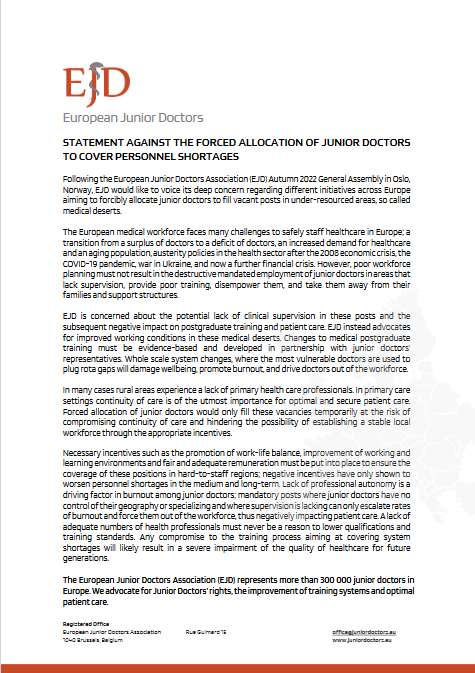EJD Statement against the forced allocation of junior doctors to cover personnel shortages

Following the European Junior Doctors Association (EJD) Autumn 2022 General Assembly in Oslo, Norway, EJD would like to voice its deep concern regarding different initiatives across Europe aiming to forcibly allocate junior doctors to fill vacant posts in under-resourced areas, so called medical deserts.
The European medical workforce faces many challenges to safely staff healthcare in Europe; a transition from a surplus of doctors to a deficit of doctors, an increased demand for healthcare and an aging population, austerity policies in the health sector after the 2008 economic crisis, the COVID-19 pandemic, war in Ukraine, and now a further financial crisis. However, poor workforce planning must not result in the destructive mandated employment of junior doctors in areas that lack supervision, provide poor training, disempower them, and take them away from their families and support structures.
EJD is concerned about the potential lack of clinical supervision in these posts and the subsequent negative impact on postgraduate training and patient care. EJD instead advocates for improved working conditions in these medical deserts. Changes to medical postgraduate training must be evidence-based and developed in partnership with junior doctors' representatives. Whole scale system changes, where the most vulnerable doctors are used to plug rota gaps will damage wellbeing, promote burnout, and drive doctors out of the workforce.
In many cases rural areas experience a lack of primary health care professionals. In primary care settings continuity of care is of the utmost importance for optimal and secure patient care. Forced allocation of junior doctors would only fill these vacancies temporarily at the risk of compromising continuity of care and hindering the possibility of establishing a stable local workforce through the appropriate incentives.
Necessary incentives such as the promotion of work-life balance, improvement of working and learning environments and fair and adequate remuneration must be put into place to ensure the coverage of these positions in hard-to-staff regions; negative incentives have only shown to worsen personnel shortages in the medium and long-term. Lack of professional autonomy is a driving factor in burnout among junior doctors; mandatory posts where junior doctors have no control of their geography or specializing and where supervision is lacking can only escalate rates of burnout and force them out of the workforce, thus negatively impacting patient care.A lack of adequate numbers of health professionals must never be a reason to lower qualifications and training standards. Any compromise to the training process aiming at covering system shortages will likely result in a severe impairment of the quality of healthcare for future generations.
The European Junior Doctors Association (EJD) represents more than 300 000 junior doctors in Europe. We advocate for Junior Doctors’ rights, the improvement of training systems and optimal patient care.
Associated Files
You might also enjoy
-

Protecting the Mental Health of Europe’s Health Workforce
MeND Survey Report
-

European and Latin American Physicians Declaration on the Protection of Life and Health in Gaza
As physicians speaking on behalf of leading professional institutions and associations across Europe and Latin America, we denounce the grave suffering endured by the civilian population of Gaza.
-

European Junior Doctors condemns attacks on healthcare and the obstruction of humanitarian aid in Gaza amid unfolding famine
European leaders must uphold international humanitarian law, protect civilians and healthcare workers, and take immediate action to stop the devastation
